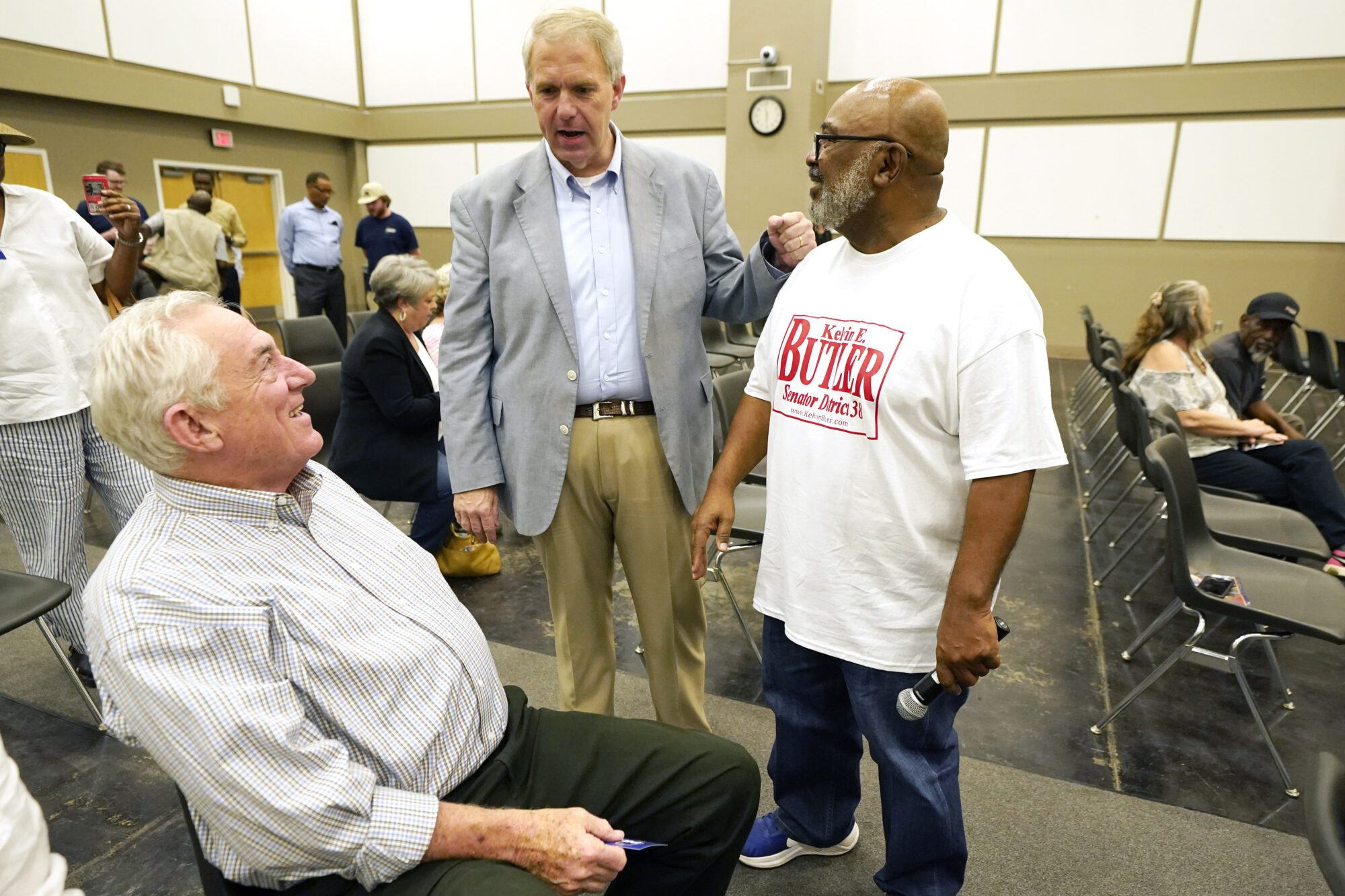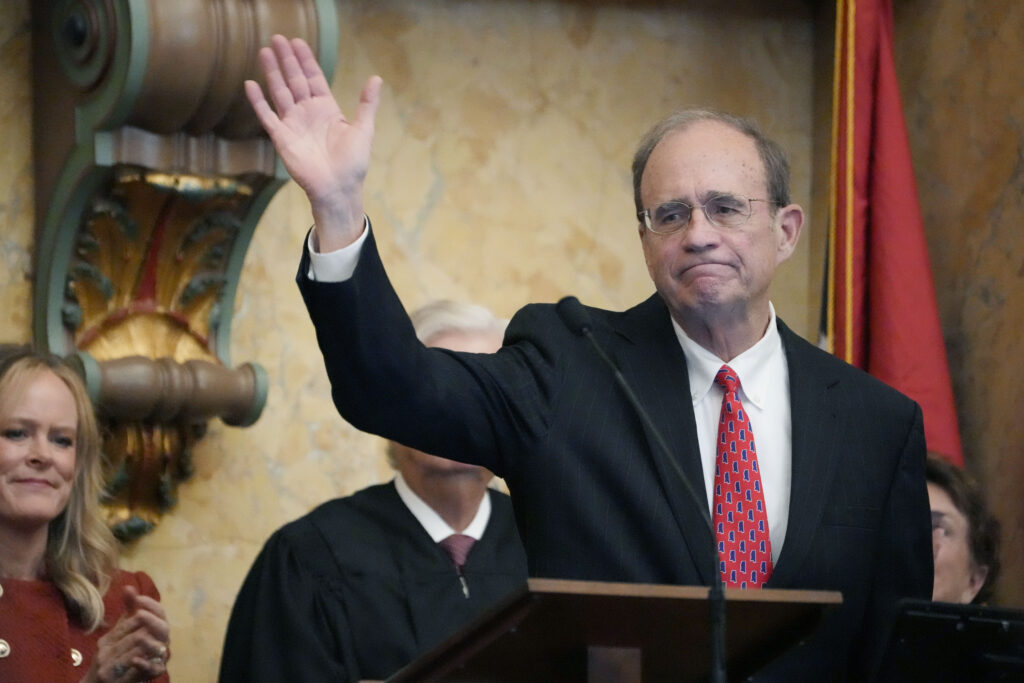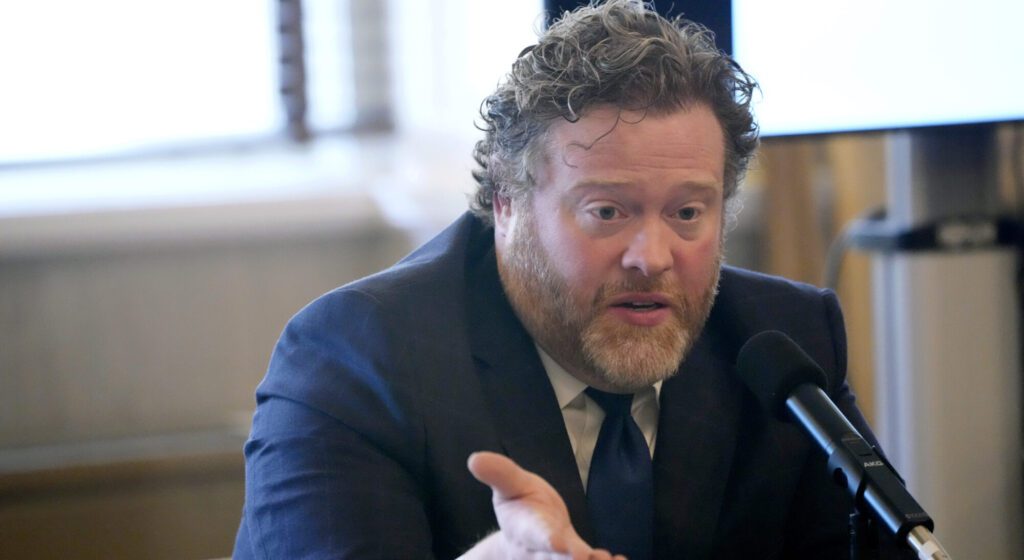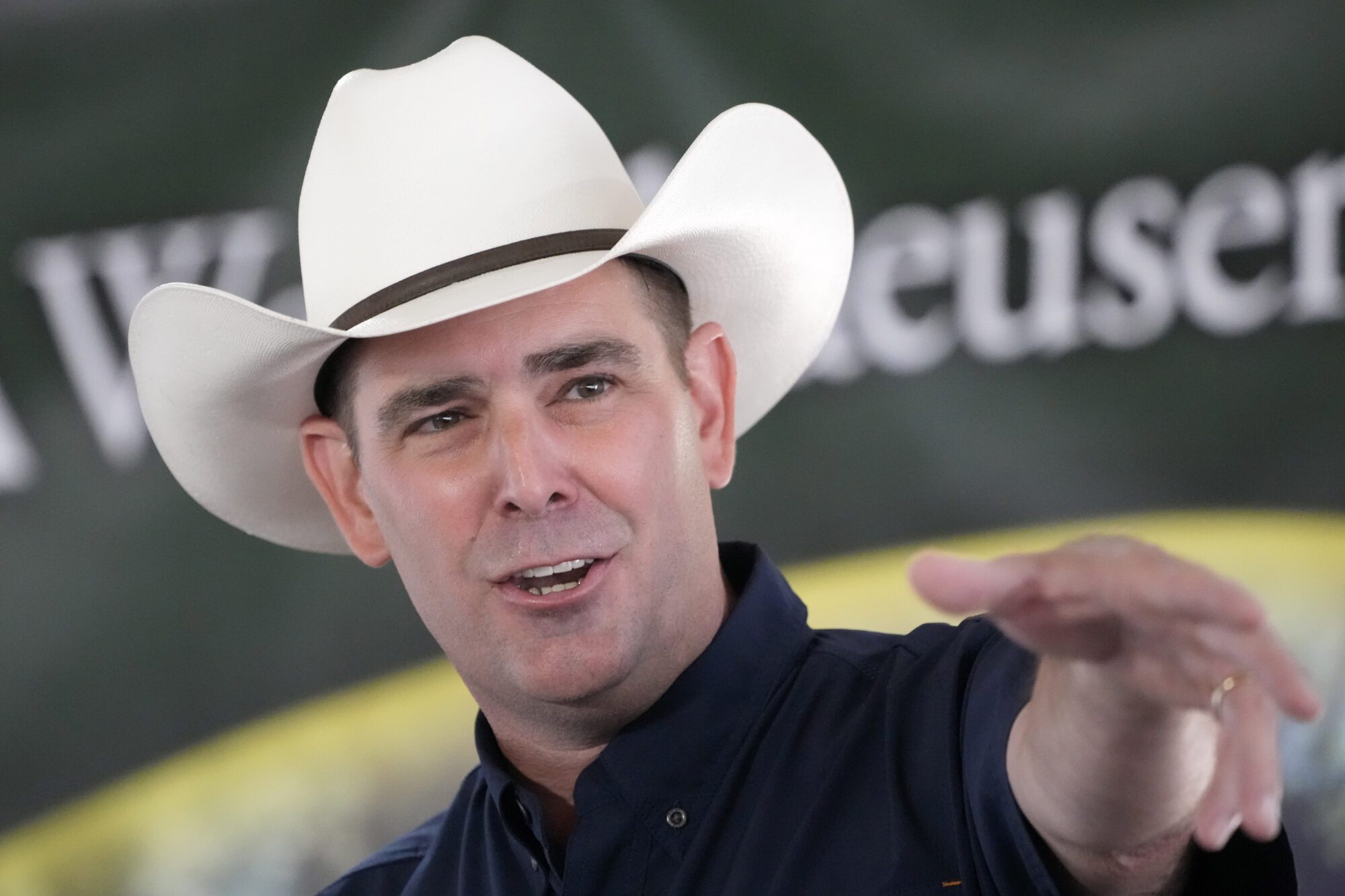
Northern District Public Service Commissioner Brandon Presley, the Democratic candidate for governor in November, center, confers with former Mississippi Democratic U.S. Rep. Wayne Dowdy, left, and State Sen. Kelvin Butler, I-McComb, during a campaign stop in Summit, Miss., Thursday, Sept. 14, 2023. (AP Photo/Rogelio V. Solis)
- Though he lost his race for the state’s top spot, Republicans in Mississippi look poised to pass the Democrat’s top agenda item, Obamacare’s Medicaid expansion
Brandon Presley lost the race for governor. Mississippi Democrats hold only 57 of 174 seats in the Legislature. One might think that would make Democratic priorities difficult.
But Republican supermajorities look poised to push Presley’s top campaign initiative, and one that Democratic leaders have pushed for the better part of a decade — Medicaid expansion under the Affordable Care Act (commonly referred to as Obamacare).
For two election cycles in a row, Medicaid expansion featured prominently in both Republican primaries and the general election for governor. And for two cycles, the candidate who opposed expansion, Gov. Tate Reeves, won. (As it turns out, when Republican voters are reminded of the genesis of Medicaid expansion, they are not keen on the idea).
In neither of those cycles did any Republican statewide elected official endorse expansion. In fact, there were denials of support for the policy and concessions along the way that expansion would not solve many of the problems identified by expansion proponents.
But Presley, Democrats, the Mississippi Hospital Association’s PAC, and allies in the media, deserve credit for pressing the issue to this point, even while lacking the political power to make it a reality themselves.

On Thursday, Lt. Gov. Delbert Hosemann announced plans to push a bill to fully expand Medicaid up to 138 percent of the federal poverty level. New Speaker of the House Jason White has voiced support for at least having a conversation about expansion, though no plan has been unveiled to date.
The Republican-controlled Legislature fell short of pushing through income tax elimination in recent years. It has not been able to muster support for wildly popular and transformational education choice policies being championed by conservatives across the country. But the appetite for a big lick with Medicaid expansion seems to be growing.
Presley’s Continued Influence
During the election last year, Presley framed his support for expansion under focus-group tested messaging on “health insurance for the working poor.” This messaging now permeates Republican arguments in favor of expansion, as well.
To be sure, “working poor” evokes sympathy in a way “welfare for able-bodied adults without dependents” does not. But the primary class of people who became eligible under Obamacare’s Medicaid expansion are able-bodied adults without dependents. And Medicaid is, in fact, a welfare program by definition. It provides a taxpayer-funded government benefit to people at no cost to them based on low income.
Who are the “working poor?” This is a category of people that is actually relatively small and somewhat misleading. The Kaiser Family Foundation estimates there are 88,000 people in Mississippi who fall into the “donut hole” between Medicaid eligibility and eligibility for a fully-subsidized private health insurance plan on the ACA exchange. Kaiser estimates 43 percent, or roughly 38,000, of these people are working.
Notably, an individual working a full-time minimum wage job would be right at 100 percent of federal poverty level and eligible for one of those fully-subsidized private health insurance plans. So “working poor” as a category of people currently ineligible for government assistance for health insurance is small and generally not people who are working full-time jobs.

Mississippi currently has over 800,000 people on Medicaid — mostly children, pregnant women, the disabled and the elderly, by design. The total state and federal cost for the program here is over $7 billion annually. Medicaid Executive Director Drew Snyder testified last week that the state’s portion of the program will balloon in the next two years from $900 million to over $1.45 billion in just two years, before expansion. The state got spoiled by federal supplements during COVID.
Estimates for how many people would be added to Medicaid under expansion have ranged from 230,000 to over 400,000 in Mississippi. In every state that has expanded, actual enrollment, and the estimated cost of that enrollment, has blown past projections, a fact which Director Snyder acknowledged in his recent testimony. Snyder projected that expansion could add an additional $250 million to the state portion of the program.
Peculiar Disconnect on Fiscal Responsibility & Infeasibility of “Work Requirements”
A common refrain from proponents of Obamacare expansion is that the federal government will bear primary responsibility for the costs. Of course, the federal government is funded by taxpayers and debt, including debt owed to enemies like China. That money comes at a price, something Republican lawmakers understand every time they rail against Democratic spending in Washington or warn of the impending calamity of the national debt. A real cognitive dissonance occurs, though, when discussing running up the federal tally in-state.
A second prominent talking point around “conservative” Medicaid expansion has been using “work requirements” to ensure that new enrollees are either working or looking for work. But Brian Blase, President Donald Trump’s former health adviser, told Magnolia Tribune in an interview that pushing work requirements in 2024 should be “immediately discredited.”
President Trump’s Center for Medicare and Medicaid Services (CMS) granted a series of work requirements while he was in office. But courts have struck those down and the Biden White House refuses to grant more. Only a single state, Georgia, still has work requirements in place. The likelihood of getting a new work requirement approved by CMS at this stage is likely nil.
This means that to the extent leaders are about to pass expansion to address the approximately 38,000 workers in the gap between Medicaid eligibility and eligibility for an ACA-exchange private plan, they will be adding 200,000-400,000 people to the rolls to do so. That’s a poorly targeted and ill-fitting solution.
A Real Conversation Would Grapple with Real Concerns
A real conversation about healthcare objectives would grapple with real concerns over Medicaid expansion, not pretend like they do not exist. It would also focus on broader supply of care and health outcome questions. After all, the presumptive purpose of Medicaid expansion would be to actually improve healthcare outcomes.
Medicaid expansion, by itself, solves none of Mississippi’s healthcare problems. It does not increase access to care. It actually makes it harder for the most vulnerable populations to access care.
RELATED: When Helping Hurts, the Risks of Medicaid Expansion in Mississippi
Medicaid as a program was designed for children, pregnant women, the disabled and the elderly. Those categories of beneficiaries already struggle in the current system. Mississippi has the worst physician access in the country, a problem which is getting worse, and the physicians we do have accept Medicaid at far lower rates than primary insurance.
Unfortunately, studies done by researchers at Harvard and Stanford have found that Medicaid expansion does not increase the number of physicians taking Medicaid patients. This means that the people the program was originally designed for will now be competing for access to a limited pool of providers.
Worse still, Medicaid expansion up to 138 percent of federal poverty level will have the effect of kicking people off of private insurance and onto welfare, as people currently eligible for fully-subsidized private plans on the ACA will no longer be eligible and small private employers save money by dropping coverage.
A study done by actuary Milliman in Florida found that a full 65 percent of their expansion population would be people dropping off of private insurance. This actually could have the effect of decreasing access to care for this population, since physicians take private insurance at a far higher rate than they accept Medicaid.
Medicaid expansion also does not solve the more pressing financial needs of hospitals, a fact which most hospital administrators will admit behind closed doors. Arkansas and Louisiana, two states that have expanded, have the same percentage of at-risk rural hospitals as Mississippi. The Becker Hospital Review published a list of hospital closures last year littered with hospitals from expansion states. Expansion is, at best, a short-term salve to longer-term, more systemic issues — like the decline in rural populations and the massive shift away from high-margin inpatient care toward outpatient care.
Related: Medicaid Expansion Not A Silver Bullet for Rural Hospitals
Lastly, for all of the talk of labor force participation, and Mississippi’s is abysmal, I fail to see how making it easier for people not to work, helps. Having over a third of our state on a welfare program moves us in the wrong direction.
Hopefully at some point before policy is passed that brings Mississippi’s ratio of workers to welfare recipients to 1:1, a conversation actually occurs — one without a preordained conclusion — and concerns about expansion are at least considered and answered.











